
Fast, affordable Internet access for all.


This week on the podcast, Christopher speaks with Deb Socia, President and CEO, and Geoff Millener, Chief Operating Officer, of the Enterprise Center in Chattanooga, Tennessee. The Enterprise Center is a non-profit partner to the City of Chattanooga that unites people, organizations, and technology to build an advanced and inclusive future.
The group discusses the HCS ED Connect program, a transformative initiative providing free home Internet access to low-income students in Chattanooga, and its notable impact on parent engagement and student success.
Deb and Jeff also shed light on the Orchard Knob project, leveraging technology to better health outcomes in African-American neighborhoods, and the Tech Goes Home program, offering technology access and training for seniors and their underserved populations.
Throughout the conversation, the group underscores the vital role of partnerships and community engagement in successfully implementing these initiatives. They conclude by emphasizing the overarching need for universal broadband access as a driving force behind fostering positive change in communities.
This show is 38 minutes long and can be played on this page or via Apple Podcasts or the tool of your choice using this feed.
Transcript below.
We want your feedback and suggestions for the show-please e-mail us or leave a comment below.
Listen to other episodes or view all episodes in our index. See other podcasts from the Institute for Local Self-Reliance.
Thanks to Arne Huseby for the music. The song is Warm Duck Shuffle and is licensed under a Creative Commons Attribution (3.0) license.

This week on the podcast, Christopher is joined by Jennifer Hawkins, CEO of One Neighborhood Builders (ONB). ONB is a nonprofit organization based in Providence, Rhode Island that works to improve lives through housing and community connection. In 2020 we spoke with Jennifer about the wireless mesh network the nonprofit piloted to address community needs at the onset of the Covid-19 pandemic. It launched to much fanfare, and ONB has been steadily working to increase its reach and impact since.
After three years and half a million dollars in capital costs, the ONE|NB Connects network has improved its wireless service to 100Mbps symmetrical speeds. And while not everyone in the Olneyville neighborhood can access the network inside of their homes (it's a gap network, after all), with thousands of unique users per month able to access reliable connections for as long as they need, Jennifer tells Chris that they are starting to see the benefits for households facing significant health and economic disparities in the community. They end the show by talking about how ONB is using the expertise it has built along the way to plan for even more durable changes: baking wired infrastructure into new affordable housing MDUs.
Read a case study of the impact of the ONE|NB Connects network for more.
This show is 33 minutes long and can be played on this page or via Apple Podcasts or the tool of your choice using this feed.
Transcript below.
We want your feedback and suggestions for the show-please e-mail us or leave a comment below.
Listen to other episodes here or view all episodes in our index. See other podcasts from the Institute for Local Self-Reliance here.
Thanks to Arne Huseby for the music. The song is Warm Duck Shuffle and is licensed under a Creative Commons Attribution (3.0) license.

A little more than three years ago, the city of West Des Moines, Iowa announced that it would build a citywide open access conduit system to lower the cost of new broadband deployment to facilitate better connections at lower costs for residents. GFiber (formerly Google Fiber), Mediacom, Lumen (formerly CenturyLink), and local ISP Mi-Fiber have since signed on as providers.
This week on the podcast, Deputy City Manager Jamie Letzring and city Innovations Consultant Dave Lyons join Christopher to talk about overcoming design and legal challenges of building an infrastructure system that remains relatively unique, and the commitment the city has made to reach economically disadvantaged households to make sure everyone has a quality and affordable connection. Finally, they share a little about how the city has been taking steps to use the new conduit system to supplement its already-robust fiber network for government facilities, smart-city initiatives, and more.
This show is 36 minutes long and can be played on this page or via Apple Podcasts or the tool of your choice using this feed.
Transcript below.
We want your feedback and suggestions for the show-please e-mail us or leave a comment below.
Listen to other episodes here or view all episodes in our index. See other podcasts from the Institute for Local Self-Reliance here.
Thanks to Arne Huseby for the music. The song is Warm Duck Shuffle and is licensed under a Creative Commons Attribution (3.0) license.
If you missed today’s Building for Digital Equity (#B4DE) livestream event – "Building Connected Communities: Sustaining the Momentum" – no sweat.
You can still see the entire program below. The latest installment of #B4DE was packed with practical information and inspiration on everything from the latest on the Affordable Connectivity Program (ACP), outreach to veterans, telehealth and broadband adoption – mixed with on-the-ground intel from local communities pushing the digital equity movement forward.
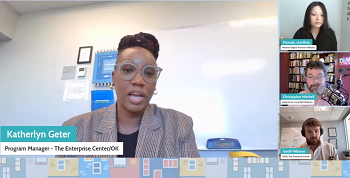
Co-hosted by ILSR’s Community Broadband Networks Initiative and the National Digital Inclusion Alliance (NDIA), the event was capped off by keynote speaker and emerging digital equity leader Joshua Edmonds, CEO of Digital C in Cleveland, who painted a powerful and expansive vision of digital equity work based on insights that have emerged from working in the trenches.
The entire #B4DE live stream, sponsored once again by UTOPIA Fiber, can be seen below. And, for other Digital Inclusion Week (DIW) engagements check out NDIA’s page here.
Lots happening for Digital Inclusion Week 2023, which kicks off this Monday. One free online event that will be of particular interest for digital equity advocates across the nation is the next National Digital Inclusion Alliance (NDIA) and Institute for Local Self Reliance (ILSR) Building for Digital Equity (#B4DE) Livestream.
The popular virtual gathering will be held this Tuesday, Oct. 3, from 12 noon to 1:15 pm ET and will focus on the DIW-inspired theme: “Building Connected Communities: Sustaining Momentum.”
Attendees can still register here.
Building on the success of our previous events, we are excited to present another engaging agenda packed with practical insights and information digital inclusion practitioners can use while working in the trenches to bridge America’s yawning digital divide.
The agenda includes:
With Digital Inclusion Week (DIW) less than a month away, ILSR and the National Digital Inclusion Alliance (NDIA) are gearing up for the next Building for Digital Equity (#B4DE) event and encouraging digital equity practitioners to save the date.
The popular virtual gathering will be held Oct. 3 from 12 noon to 1:15 pm ET and will focus on the DIW-inspired theme: “Building Connected Communities: Sustaining Momentum.” The event is free and open for registration here.
Building on the success of our previous events, we are excited to present a fun and informative agenda that will cover:
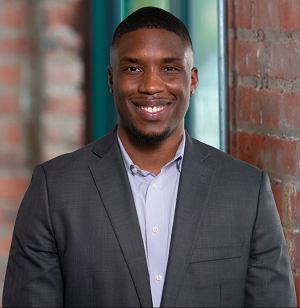
The keynote speaker for the event will be Joshua Edmonds, CEO of Digital C, the Cleveland-based nonprofit technology social enterprise. Edmonds will focus on the link between building appropriately-motivated physical networks and how infrastructure and digital equity work go hand-in-hand.
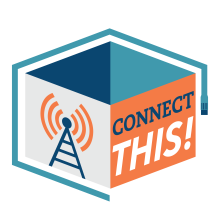
Join us Tuesday, August 8th at 2pm ET for the latest episode of the Connect This! Show. Co-hosts Christopher Mitchell (ILSR) and Travis Carter (USI Fiber) will be joined by regular guests Doug Dawson (CCG Consulting) and Kim McKinley (UTOPIA Fiber) and special guest Robert Wack (Carroll County, Maryland Health Department) to talk about all the recent broadband news that's fit to print, including progress on the Westminster Fiber Network and what's looking like Anna Gomez's speedy confirmation to the FCC.
Email us at broadband@communitynets.org with feedback and ideas for the show.
Subscribe to the show using this feed or find it on the Connect This! page, and watch on LinkedIn, on YouTube Live, on Facebook live, or below.
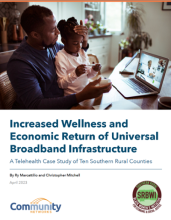
In a new report, published in partnership with the Southern Rural Black Women’s Initiative (SRBWI), the Institute for Local Self-Reliance (ILSR) Community Broadband Networks Initiative examines the link between high-speed Internet infrastructure, access to healthcare, and the economic implications involved.
The report –“Increased Wellness and Economic Return of Universal Broadband Infrastructure: A Telehealth Case Study of Ten Southern Rural Counties” has particular relevance for those living in rural broadband deserts as it details how universal, affordable, broadband infrastructure would return $43 million per year using telehealth across 10 counties in the Black Belt of Alabama, Georgia, and Mississippi. Read Increased Wellness and Economic Return of Universal Broadband Infrastructure: A Telehealth Case Study of Ten Southern Rural Counties [pdf].
It explains how robust broadband infrastructure could pay for itself in short order and open up untold access to healthcare, educational opportunities, economic development, community engagement, and other benefits along the way. This issue is particularly relevant today, because the BEAD program represents a once-in-a-generation investment in broadband infrastructure, larger than any other federal grant program many times over. While it will solve the issue of access to infrastructure for most rural households, we have significant concerns about affordability - BEAD will lead to new connections, but states have wide latitude as to which ISPs get those funds to build new connections. The national monopolies have a long history of charging more to exactly the communities that can’t pay as much, leaving many households out. The report argues that electric cooperatives offer better and more locally accountable paths to universal, affordable service.
Drawing on academic scholarship and existing telehealth programs at hospitals around the country, the report focuses on an assortment of chronic health ailments plaguing those counties, such as diabetes, chronic respiratory disease (including asthma, chronic obstructive pulmonary disease, emphysema, heart disease, heart failure, cancer, obesity, and mental health and then demonstrates the benefits that could come from effective telehealth interventions for each
In partnership with the Southern Rural Black Women’s Initiative (SRBWI), today ILSR is releasing a new report that examines the link between high-speed Internet infrastructure, access to healthcare, and the economic implications involved.
The report – “Increased Wellness and Economic Return of Universal Broadband Infrastructure: A Telehealth Case Study of Ten Southern Rural Counties” – has particular relevance for those living in rural broadband deserts as it details how universal, affordable, broadband infrastructure would return $43 million per year using telehealth across 10 counties in the Black Belt of Alabama, Georgia, and Mississippi.
At a virtual press briefing today, SRBWI leaders and organizers were joined by Dr. Sandra B. Reed of Emory Healthcare; as well as ILSR Senior Researcher and the report’s lead author, Ry Marcattilio, to explain how robust broadband infrastructure could pay for itself in short order and open up untold access to healthcare, educational opportunities, economic development, community engagement, and other benefits along the way.
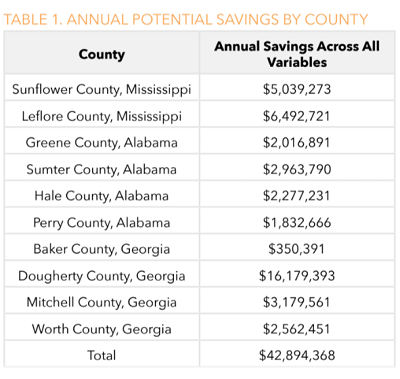
“It’s easy to miss the connection, but hard to overlook what’s at stake as rural hospitals close and the cost of transportation to get to far-off healthcare facilities presents a real barrier. This is about access to healthcare and Black women being denied the opportunity to take advantage of telehealth. The broadband infrastructure that’s needed for that just isn’t there,” said Shirley Sherrod, SRBWI State Lead for Georgia and Director of the Southwest Georgia Project in Albany Georgia.
Broadband … to Access Longer, Healthier Lives
This year's Mountain Connect conference begins Monday, May 23rd and runs through Wednesday, May 25 in Keystone, Colorado. The conference's self-stated goal is to "move our western US communities forward by providing relevant and targeted content to help them make the most effective decisions as they build new or expand existing telecommunications infrastructure that enable the long-term vision of a community."
It will feature panels on navigating state and federal funding, telehealth, disaster resilience, digital inclusion, tribal connectivity, construction challenges, and communications and technology standards.
We'll also get to hear an array of conversations with local leaders, talking about everything from revitalizing downtowns with new municipal broadband infrastructure, to partnerships, to open access, to marketing, to managing subscriber expectations. See the full agenda here.
Anchoring the panels will be communities like Boulder, Colorado, Loveland, Colorado, and Detroit, Michigan, with familiar faces and industry veterans helping to break things down in clear ways, including Peggy Schaffer (ConnectME), Joshua Edmonds (Director of Digital Inclusion, Detroit), Brian Snider (Lit Communities), Bruce Patterson (EntryPoint Networks), and Gary Bolton (Fiber Broadband Association).
ILSR's DeAnne Cuellar will be participating on a digital inclusion panel moderated by NDIA's Paolo Balboa with Colorado Department of Labor's Katherine Keegan. Likewise, Christopher Mitchell will moderate a panel with Peggy Schaffer, Eric Forsch (Idaho Commerce) and Veneeth Iyengar (ConnectLA) to talk about how states will use the BEAD money. See the full slate of speakers here.